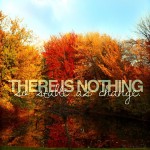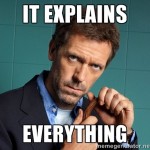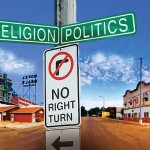Recently, my 14 year-old son announced that he is an atheist. The reactions of friends and family to his announcement have been at least as interesting as the announcement itself. To put this in context, my son has been his whole life devoutly Mormon. Even at a young age, he was precociously religious. So this came as a bit of a shock. I shared my daughter’s dismay when she said that she was having trouble thinking of my son as anything but Mormon.
But my son is also a science lover. He recently finished reading Steven Hawking’s The Universe in a Nutshell, and it was all he could talk about for weeks. He took it to school and even would have taken it to a friend’s party if we had not intervened. I had previously predicted that his Mormonism and his scientific inclinations would come into conflict, but he had assured me that, in his mind, religion and science were separate domains, like Steven Jay Gould’s “non-overlapping magisteria”, and there was no conflict. Ironically, I don’t think it was Stephen Hawking specifically, or even science generally, which precipitated my son’s announcement. It was rather his enrollment in the Mormon “seminary” program, a kind of daily Bible study for Mormons. Heightened participation in a religion can force a person to go one way or the other, in or out, where they previously had been comfortable on the ambiguous periphery, and I think that is what happened in this case.
Anyway, my wife, who is Mormon, was upset by my son’s announcement (though, of course, proud of my son himself) . It’s natural for parents to want to see their children follow in their footsteps. I too found myself troubled by my son’s declared atheism, which is odd, because I have sometimes referred to myself as an atheist, especially when contrasting myself with a certain type of theist. It’s not that I was hoping my son would identify as Pagan, although that would be cool. Rather, I was concerned that his atheism would translate into a kind of “flat earth” reductive materialism that bleeds the world of beauty and meaning and everything that makes life an interesting adventure. (Of course, there is quite a diverse spectrum of atheists, and the worldview of some theists can be just as reductive and anemic.) But I was relieved to find out that that he and I could still talk about “God”, so long as it was qualified by “whatever you conceive God to be.” And that was enough for me, so long as he was making room for the mystery.
This did make me wonder what exactly being an “atheist” meant to him, though. The same question came up recently, when an acquaintance told me that her teenage daughter had also announced she is an atheist … because she is “angry at God”. It makes me wonder whether the confusion (if there is any) is about the word “atheism” or the word “God”. It’s not just teenagers who are using the words “atheism” and “God” expansively. Earlier this month, Oprah drew (more than the usual) attention when she interviewed Diana Nyad, who recently completed a historic swim from Cuba to Florida. The exchange, if you haven’t heard it already, went like this:
Oprah: “You told our producers that you’re not a God person, but you’re deeply in awe?”
Nyad: “Yeah, I’m not a God person. Yeah, I am not a God person. Do I argue against my friends who are religious–Buddhists, Jews, Christians? No–”
Oprah: “Do you consider yourself atheist?”
Nyad: “I am an atheist.”
Oprah: “But you’re in awe?”
Nyad: “I don’t understand why anyone would find a contradiction in that. I can stand at the beach’s edge with the most devout Christian, Jew, Buddhist and still weep at the beauty of this universe, and be moved by all of humanity. So to me, my definition of God is humanity, and is the love of humanity.”
Oprah: “Well I don’t call you an atheist then. I think if you believe in the awe and the wonder, and the mystery, then that is what God is. That is what God is. It’s not the bearded guy in the sky.”
Nyad went on to explain that she rejects the associations of a personal creator or overseer with the word “God”. (You can see the exchange on YouTube here.)
With the last statement, Oprah managed to piss off both atheists and theistic Christians — the former feeling like she was trivializing the “a” in atheism, and the latter upset because that’s not what God is to them. (Of course, neither group was ever particularly fond of Oprah to begin with.) In Oprah’s defense, Nyad had said that her “definition of God is humanity” just before Oprah declared that she did not consider Nyad an atheist. I can understand Oprah’s confusion when a self-declared atheist is using God-language.
However you feel about this exchange, the fact is that it’s not an unusual one. Nyad is not the only person confused about the term “God” and Oprah is not the only person confused about the term “atheist”. According to a Pew Research study, of the growing number of American atheists, a statistically significant number of them, 14%, say they believe in God or a universal spirit, and 5% say they are “absolutely certain” about the existence of a God or a universal spirit. Now you can say that 14% of atheists just need to buy a dictionary, but I don’t find any explanation satisfactory which simply dismisses other people as stupid. Something significant is going here. Part of the answer lies in the responses to another part of the survey which revealed that 82% of self-described atheists said they either often (52%) or sometimes (30%) feel a deep connection with nature and the earth. (Similar percentages were found among the population as a whole.) This suggests that, like Oprah, people may be defining God non-theistically (if that’s not a contradiction in terms) or pantheistically.
I found Wikipedia helpful here, at least to the extent that it recognized that the term “theism” has both a broad definition and a specific definition. Broadly, it means the belief in at least one “deity”. In the more specific sense, according to Wikipedia, “theism” means the belief in a single (i.e., monotheistic) God who is “personal, present, and active in the governance and organization of the world and the universe.” The same Pew survey discussed above revealed that while 7% of Americans do not believe in God or a universal spirit, only 2.4% identify as “atheists”. So not only are there self-described atheists who believe in God, there are people (4.6% of the population) who do not believe in God who also don’t describe themselves as atheists. Wikipedia defines “atheism” as a rejection of theism in the broad sense, whereas a rejection of theism in the narrow sense may take the form of deism, pantheism, and even polytheism. It seems then that some people are using the term “atheism” to describe what Wikipedia calls deism or pantheism. While this is enlightening, I think the discussion about what atheism means (like the discussion about what Pagan means) can take a turn for the worse when the dictionaries get whipped out and people start emphatically saying things like “words have meaning”. I’m all for clarifying terminology if it’s going to lead to more dialogue, but more often than not it seems it is more about one or more group claiming authority to define a word for everyone else.
Rather than saying “I don’t call you an atheist”, which has been interpreted as a refusal to acknowledge Nyad’s self-definition (we’ve seen this kind of identity politics in the Pagan community), Oprah would have been better served by explaining what qualities she has always associated with the term “atheist”, while observing that those qualities do not seem applicable to Nyad. Like Oprah, and perhaps like the 4.6% of people who don’t believe in God but also don’t call themselves atheists, “atheism” has long been associated in my mind with reductionism and disbelief (in contrast to non-belief), not to mention a kind of “religious” zeal which is like the mirror image of theistic evangelism. This was what I was afraid my son was identifying with when he called himself “atheist”. But it seems that, like that 14% of atheists who believe in God, my son is using the term “atheism” in a different way … as a way to make room for mystery.
Physicist Richard Fenyman said that “God was invented to explain mystery. God is always invented to explain those things that you do not understand. Now, when you finally discover how something works, you get some laws which you’re taking away from God; you don’t need him anymore.” (quoted in Superstrings : A Theory of Everything?, ed. Paul Davies and Julian Brown (1988)). But I disagree with Fenyman. Certainly, some religious fundamentalists see God as an explanation. But for me, and I think for my son and for an increasing number of people, “God” is the name for the mystery, for what cannot be explained reductively. It is the name that both Oprah and Nyad use to describe that which evokes the feeling of awe in us. It does not seek to explain — that is the purview of science. Instead, it makes room for questions (and in that way complements science). Another physicist, Erwin Schroedinger, expresses my view of this issue:
“I am very astonished that the scientific picture of the real world around me is very deficient. It gives a lot of factual information, puts all our experiences in a magnificently consistent order, but is ghastly silent about all and sundry that is really near to our heart, that really matters to us. It cannot tell us a word about red and blue, bitter and sweet, physical pain and physical delight; it knows nothing of beautiful and ugly, good or bad, god and eternity. Science sometimes pretends to answer questions in these domains, but the answers are very often so silly that we are not inclined to take them seriously.” — Erwin Schroedinger, Nature and the Greeks (1954)
God is not the answer to our questions about the meaning of life. “God” (or “Goddess” if you prefer) is the name for the question itself. This is not a God in the gaps, in the sense of God filling the gaps in our knowledge of the universe, gaps which are increasing shrunk by the advance of science. This is a God who is a gap-maker, a God whose only commandment is to “forbid our premature closing of accounts with reality” (William James), a God who reminds us to “love the questions” (Rilke) at least as much as the answers. In this way, I think it does make sense to talk about atheists who believe in God. These are people who reject a narrow kind of theism — which sees God as an explanation — in favor of a new kind of non-theism — which sees God as a question. For these people, God is that which provokes awe in us. Awe is the experience of a great big question mark (followed perhaps by an exclamation point) thrown out into the universe. As long as my son is experiencing that question, I will not fear for him, no matter how he describes himself.
lest we would sift it down
into fractions, and facts
certainties
and what the soul is, also
I believe I will never quite know.
Though I play at the edges of knowing,
truly I know
our part is not knowing,
but looking, and touching, and loving,
which is the way I walked on,
softly,
through the pale-pink morning light.— Mary Oliver, “Bone”















